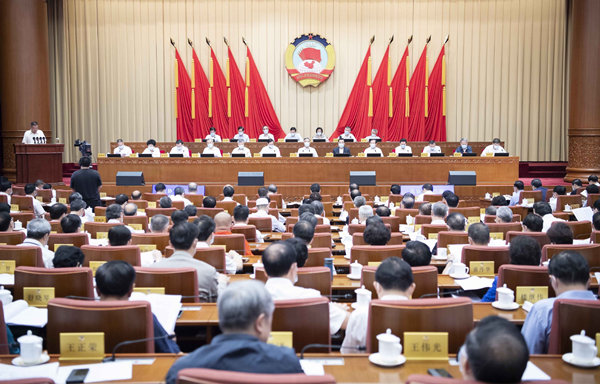CPPCC members to pool wisdom on poverty

Wang Yang, a member of the Standing Committee of the Political Bureau of the Communist Party of China Central Committee and chairman of the Chinese People's Political Consultative Conference (CPPCC) National Committee, attends a plenary meeting of the 12th session of the Standing Committee of the 13th CPPCC National Committee in Beijing, capital of China, June 24, 2020. Chinese People's Political Consultative Conference members Wednesday put forward suggestions for the country's poverty alleviation efforts during a session of the standing committee of the CPPCC National Committee. (Xinhua/Li Tao)
Chinese People's Political Consultative Conference (CPPCC) members should continue to pool their wisdom and build consensus to contribute to China's poverty relief work, Wang Yang said on June 24.
Wang Yang, a member of the Standing Committee of the Political Bureau of the Communist Party of China Central Committee and chairman of the National Committee of the Chinese People's Political Consultative Conference, was speaking after a three-day meeting of the Standing Committee of the 13th CPPCC National Committee in Beijing.
He called for institutionalized practices formed during the CPPCC's long-term poverty alleviation efforts to be summarized.
The theme of the meeting was winning the battle against poverty and establishing a long-term mechanism to address relative poverty. It was the fifth consecutive year that the CPPCC National Committee made poverty alleviation a consultation topic.
Wang said the meeting was held at an important moment, with the country entering the final stage of the fight against poverty. That allowed the CPPCC to give full play to its institutional advantages and serve the overall interests of the central leadership.
Applauding CPPCC members' consultations and suggestions during the meeting, Wang said, "Stronger confidence is needed in reaching the goal and harder work should be done to ensure quality."
Pragmatic and effective institutional guarantees and long-term mechanisms are needed to consolidate the achievements of poverty relief work, he added.
CPPCC member Chen Lei said a transitional period should be set up for areas lifted out of absolute poverty according to local conditions, during which supporting policies should be maintained.
A mechanism is also needed to monitor those most at risk of sliding back into poverty due to the COVID-19 pandemic, disasters and other illnesses, and assistance needs to be provided to them in a timely manner, Chen said.
The country should strengthen "top-level design" to tackle relative poverty, including establishing a system to identify, assist and evaluate relative poverty, and carry out pilot projects, he said.
Chen said villages and people lifted out of poverty could be included in the country's rural revitalization strategy to consolidate poverty relief achievements.
Xie Ru, another CPPCC member, said the country should handle the relationship between the roles of government and the market correctly when providing supporting measures in the building of a long-term mechanism to target relative poverty.
The allocation of resources should move from being administered by government to greater reliance on the market, she said.
Provincial-level CPPCC members and grassroots representatives from the Guangxi Zhuang autonomous region, Chongqing and Sichuan province attended the discussions via video link, along with CPPCC National Committee members from Hong Kong and Macao.
Copyright © The National Committee of the Chinese People's Political Consultative Conference.
All rights reserved. Presented by China Daily.
京ICP备08100501号-1

